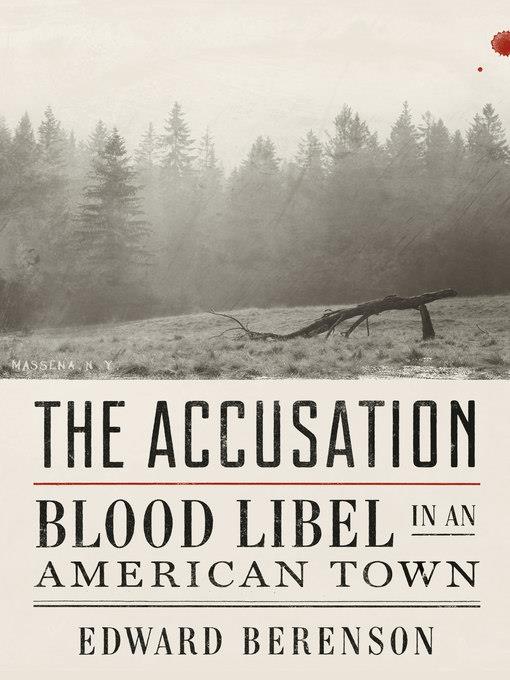
The Accusation
Blood Libel in an American Town
کتاب های مرتبط
- اطلاعات
- نقد و بررسی
- دیدگاه کاربران
نقد و بررسی

July 1, 2019
NYU history professor Berenson (Europe in the Modern World: A New Narrative History Since 1500) provides a comprehensive look at a little-known episode of American anti-Semitism in this thoughtful history. In 1928, shortly after four-year-old Barbara Griffiths failed to return home from an errand, rumors circulated in her Upstate New York town that she had been the victim of Jews who intended to use her blood for ritual purposes. That baseless theory was endorsed by both the mayor of the village of Massena and the lead police investigator, who called in the local rabbi for an interrogation. The slander was rebutted when an unharmed Barbara resurfaced the next day, explaining that she’d gotten lost and had fallen asleep in the woods. Berenson uses this incident to explore the origins and history of the blood libel (accusations that Jews used Christian blood for ritual purposes) and the shifting attitudes toward Jews in American history. As this instance did not lead to other similar accusations, the author concludes that “the Massena blood libel ultimately showed that American civilization, at least in relation to its Jewish population, was stronger than many people thought.” Berenson’s study benefits from his having interviewed several people alive at the time, including Griffiths, and wisely avoids sensationalism. Readers interested in the recurrence of anti-Semitism in the U.S. will find food for thought here.

August 1, 2019
In the 1920s, Massena, NY, may have seemed an unlikely place for an accusation of ritual murder against the town's numerous Jewish residents. Yet as Berenson (history, New York Univ.; Europe in the Modern World) demonstrates, all the elements were there when a four-year-old girl went missing in the fall of 1928, even though she was found alive a day later. The town, with its many French-Canadian residents, had a deeper cultural memory of European blood libel than was common in the United States, with well-organized anti-Semitism in France and Quebec. The time was right, too, as the bitter rhetoric in the election between Herbert Hoover and Al Smith and the revival of the Ku Klux Klan allowed anti-Catholic prejudice to be transferred to Jews, helped along by Henry Ford's promulgation of anti-Semitism. That Massena is Berenson's hometown and this story has connection to his work as a French history scholar makes what could be an overly scholarly account personal. VERDICT This vignette of American Jewish history will be illuminating to readers of Jewish and regional U.S. history, for the particular factors relevant to upstate New York.--Margaret Heller, Loyola Univ. Chicago Libs.
Copyright 2019 Library Journal, LLC Used with permission.

A native of a village in upstate New York turns in a strange and riveting story of anti-Semitism in an era not far removed from our own. On Sept. 22, 1928, a 4-year-old girl disappeared into the woods outside Massena, New York. Within hours, writes Berenson (History/New York Univ.; Europe in the Modern World: A New Narrative History Since 1500, 2016, etc.), hundreds of people had assembled to search for her. "Several hours into the search," he writes, "someone--it's unclear who--floated the idea that Barbara had been kidnapped and killed by the Jews." That accusation quickly took root even if Jews were well known as residents in "an ethnically and religiously diverse population" that had once been almost all white and Protestant in the agricultural era but, once industry arrived, introduced an immigrant population, most from neighboring Canada but many from Eastern Europe and Italy. Berenson's grandfather, a chemical engineer from Boston, was a newcomer as well to a town with 20 Jewish families who "suddenly found themselves transported back to the Old World of anti-Jewish hostility from which they fled." When it developed that the "blood libel," the charge that Jews killed Christian children for blood to use in religious rituals, had not been fulfilled and the girl was safe, things slowly returned to something approaching normality--save that there are now only 10 Jews in Massena, and its small synagogue closed in 2012 even as the town has sunk into poverty. In this fluent account, Berenson explores the effect of the incident, the blood libel charge having been common in Europe but altogether rare in the U.S. even in those days of rising fascism. Moreover, he examines the history of blood libel, tracing it to medieval England, which was long used to excuse pogroms and other persecution in an ugly history that culminated in the Holocaust. An excellent work of scholarly detection, especially timely in an age when the immigrant "other" is under constant suspicion.
COPYRIGHT(2019) Kirkus Reviews, ALL RIGHTS RESERVED. (Online Review)

























دیدگاه کاربران